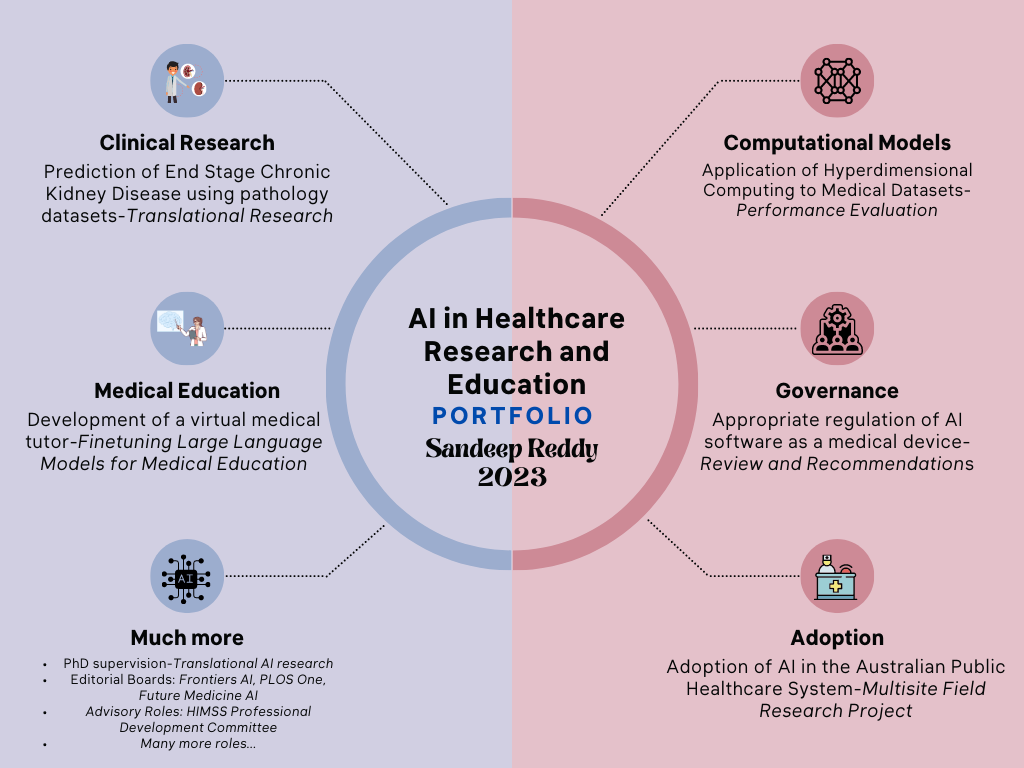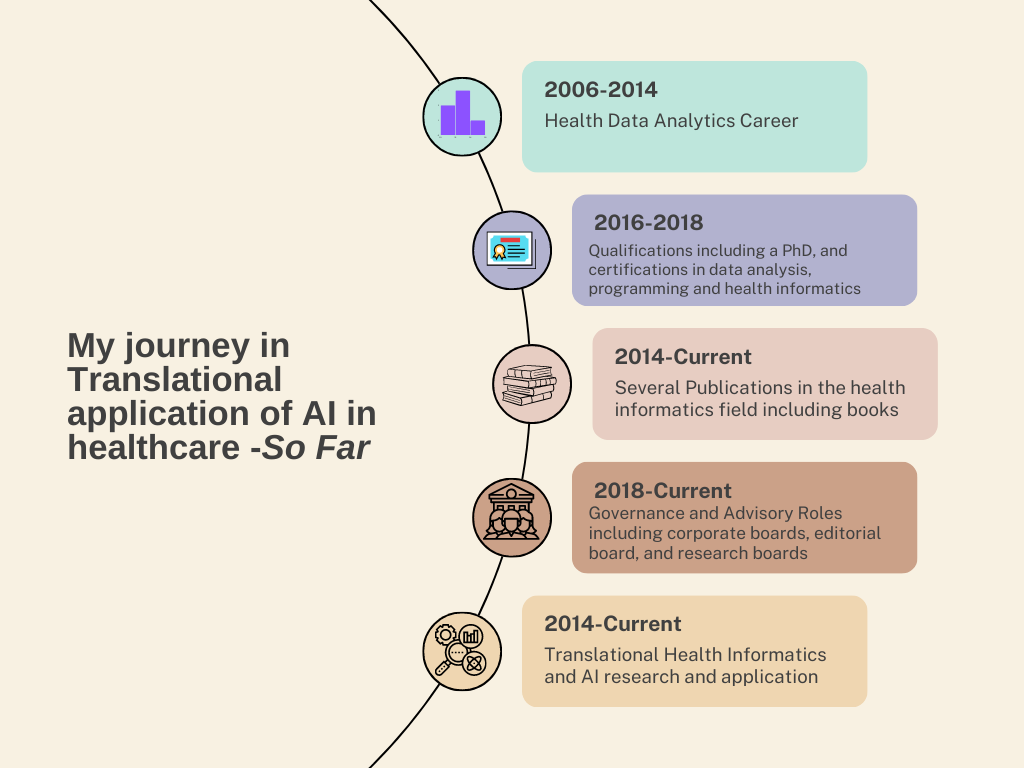|
I am often approached by clinicians, healthcare managers, and many others with a non-engineering/computer science background as to how to get started with an applied AI role in healthcare. To the disappointment of many, my advice is not very palatable as it presents many intricate steps to get one established in this area. Unfortunately, there is no quick and easy path to achieving your goals in this field. It involves hard work, but importantly, focusing on key areas to ensure you are on the right track. However, if one was clearly determined and willing to put in the necessary efforts, the benefits would be multifold. Let me relate my journey, it may help add perspective to the advice I provide. Since the start of my professional career, I have interacted with and used various datasets and analytical techniques to inform my work and that of my employer organizations. Data included medical, public health, census, hospital performance, and financial information. I have used SPSS, SAS, Power BI, Excel, GIS, Tableau…etc. for analyzing and presenting the data in my various roles, especially when I was working for governmental agencies, across New Zealand, Denmark, and Australia. However, it was during the days of my PhD study that I came across machine learning as a powerful analytical tool. I was developing a statistical correlational model linking emergency department performance to that of hospital funding for my PhD study. Although I ended up using a simple linear equation and trend analysis for my statistical model, my interest in machine learning persisted. A few years later, having completed my PhD, I approached some established AI researchers and machine learning engineers, to seek advice on establishing oneself in this area. However, none seemed interested in offering time or advice. I wouldn’t entirely blame them, as my profile (a medical doctor with a public health medicine/healthcare management career) did not seem to align with their idea of an AI practitioner. However, what was not obvious to them was my experience and interest in data analysis and my determination to establish myself in this area. The first thing I did was spend considerable time reading machine learning and AI books (I must have spent over a thousand dollars in that period stocking up my library with such books), followed by enrollment in machine learning/data analysis courses (online and on-site). I also separately started training in Python programming (I never felt inclined to learn R) and practised what I learned by building simple machine learning models (the classic image classification exercises J). It was now the time to consider how you could apply what I learned in medicine/healthcare. I quickly realized that AI as a technology does not operate isolated in healthcare, it must be part of a digital ecosystem. So, this meant I had to be across details of health IT. Fortunately, in Australia, I had a pathway to be certified in Health IT, i.e., Certified Health Informatician Australasia (CHIA). Preparing for the certification, meant reading up on all aspects of health IT theory and implementation, followed by a vigorous exam. When I did get certified, it gave me a significant morale boost to progress to the next steps to establish myself in this field. It is often said that the best way to educate oneself is to write. In my case, this is very accurate. I committed myself to writing not only to educate myself but also others. I was very fortunate to be working in an environment/role that allowed me to pledge to this endeavour. Likewise, I started my publication in this field with a book chapter about AI and its application in healthcare, which has since been followed by three books, four book chapters, thirty or so articles (peer-reviewed and non-peer-reviewed), and obviously, many more to come. Writing gets you to be critical of not just your topic, but also your understanding of the topic, especially when it goes through a peer review process. This is why I prioritize publication in journals, as the peer review process adds vigour and credibility to your writing outputs. During the early period of my AI career, I encountered resistance and unwillingness from various others to engage in AI projects. I had noted, through my research, that there were many areas in healthcare that would benefit from AI applications. As they say, if you can’t get the mountain to come to you, you must go to the mountain. In this instance, to fulfil my AI aspirations and obtain experience implementing AI projects in medicine, I established my own AI focused company. Since then, I have had the fortune of other like-minded individuals joining the company. Involvement in the company and several AI projects meant I obtained invaluable hands-on experience developing and deploying AI models. Now, I only play a governance role with the company, but involvement in an industry role brings you expertise and experience that pure research roles may not. As time passed, the momentum built through my earlier steps positively impacted my AI research/academic side I now engage in the entire continuum of the AI pathway-from development to deployment of models to policy and governance. This is nicely captured in my current academic projects (as of August 2023).  By no means, I have attained my peak as an AI in healthcare practitioner, and as Robert Frost put it, I “have promises to keep and miles to go before I sleep” but I feel a certain momentum or foundation has been established based on my two decades of data analysis and approximately a decade of dedicated AI work, that I see a clearer path to my involvement in AI in healthcare. I am certainly optimistic about the prospects of AI in medicine/healthcare and feel that we will lose a significant opportunity to address healthcare’s intractable problems if we ignore or do not adopt AI technology. As I look back on my journey and small accomplishments so far in this field (below illustration), I feel that I have a role to play in the coming years to enable this adoption, and I hope to find collaborators to join me in this journey.
0 Comments
Leave a Reply. |
AuthorHealth System Academic Archives
December 2023
Categories |

 RSS Feed
RSS Feed